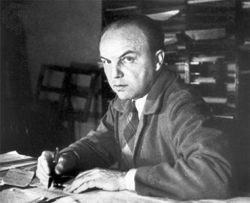Krenek, Ernst
Biography
Born: August 23, 1900 Austria
Died: December 22, 1991
Country: Austria - USA
Studies: Vienna & Berlin Academies of Music
Teachers: Franz Schreker
Website: www.krenek.com
Ernst Krenek (August 23, 1900 – December 22, 1991) was an Austrian-born composer of Czech ancestry; throughout his life he insisted that his name be written Krenek rather than Křenek, and that it should be pronounced as a German word. He explored atonality and other modern styles and wrote a number of books, including Music Here and Now (1939), a study of Johannes Ockeghem (1953), and Horizons Circled: Reflections on my Music (1974).
Krenek was born in Vienna. He studied there and in Berlin with Franz Schreker before working in a number of German opera houses as conductor. During World War I, Krenek was drafted into the Austrian Army, but he was stationed in Vienna, allowing him to go on with his musical studies. In 1922 he met Gustav Mahler's daughter, Anna, and her mother, Alma, who asked Krenek to complete her late husband's Symphony No. 10. Krenek helped edit the first and third movements but went no further. In 1924 he married Anna, only to divorce her before the first anniversary.
His journalism was banned and his music was targeted in Germany by the Nazi Party in 1933. On March 6, one day after the Nazis gained controll of the Reichstag, Krenek's incidental music to Goethe's Triumph der Empsindsamkeit had to be withdrawn in Mannheim and pressure was brought to bear on the Vienna State Opera, which cancelled the commissioned premiere of Karl V. The jazz imitations of Jonny spielt auf were included in the 1938 Degenerate art exhibition in Munich. He moved to the United States of America in 1938 where he taught music at various universities, including Hamline University in Saint Paul, Minnesota from 1942-1947. He became an American citizen in 1945. His students included George Perle and Robert Erickson. He died in Palm Springs, California.
Krenek's music is in a variety of styles. His early work is in a late-Romantic idiom, showing the influence of his teacher Franz Schreker. He later embraced atonality, but a visit to Paris, during which he became familiar with the work of Igor Stravinsky and Les Six, led him to adopt a neo-classical style. His opera Jonny spielt auf (Johnny Strikes Up, 1926), which is influenced by jazz, was a great success in his lifetime, playing all over Europe. In spite of Nazi protests, it became so popular that even a brand of cigarettes, still on the market today in Austria, was named "Johnny". He then started writing in a neo-Romantic style with Franz Schubert as a model, with his Reisebuch aus den österreichischen Alpen as prime example, before using Arnold Schoenberg's twelve-tone technique; the opera Karl V (1931-33) is entirely written using this technique, as are most of his later pieces. In the Lamentatio Jeremiae prophetae (1941–42) he combined twelve-tone writing with 16th century techniques of modal counterpoint. He also composed electronic and aleatoric music.[1]
Works for Percussion
Marginal Sounds, op.162 - Percussion Septet; Violin
References
- ↑ http://furiousartisans.com/artists/ernst-krenek Accessed June 25, 2013
